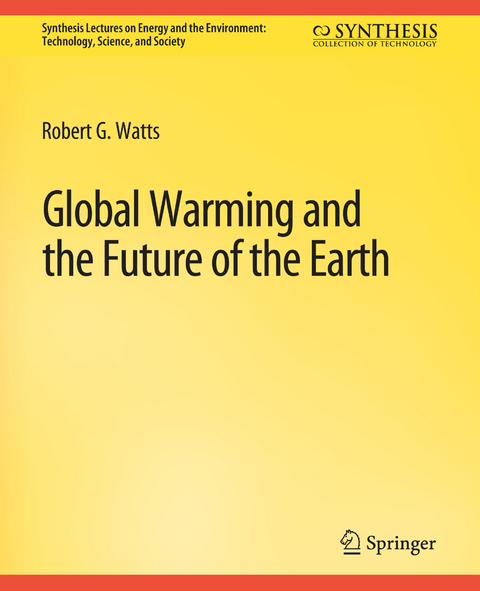The globally averaged surface temperature of the Earth has increased during the past century by about 0.7°C. Most of the increase can be attributed to the greenhouse effect, the increase in the atmospheric concentration of carbon dioxide that is emitted when fossil fuels are burned to produce energy.The book begins with the important distinction between weather and climate, followed by data showing how carbon dioxide has increased and the incontrovertible evidence that it is caused by burning fossil fuels (i.e., coal, oil, and natural gas). I also address the inevitable skepticism that global warming arouses and offer a number of responses to the global warming skeptics. After dealing with the skeptics, I analyze both the current and future effects of global warming. These future effects are based on scenarios or "storylines" put forth by the International Institute for Applied Systems Analysis. In closing, I address the controversial (and grim) suggestion that we have already passed the "tipping point," which is the time after which, regardless of our future actions, global warming will cause considerable hardship on human society. I intend this book to be approachable for all concerned citizens, but especially students of the sciences and engineering who will soon be in a position to make a difference in the areas of energy and the environment. I have tried to frame the debate in terms of what the engineering community must do to help combat global warming. We have no choice but to think in terms of global environmental constraints as we design new power plants, factories, automobiles, buildings, and homes. The best thing for scientists to do is to present what we know, clearly separating what is known from what is suspected, in a non-apocalyptic manner. If matters are clearly and passionately presented to the public, we must be prepared to accept the will of the people. This presents the scientific community with an enormous responsibility, perhaps unlike any we have had in the past.Contents: Weather and Climate (and a Little History) / Are the Concentrations of Greenhouse Gases in the Atmosphere Increasing? / The Greenhouse Effect and the Evidence of Global Warming / The Skeptics: Are Their Doubts Scientifically Valid / Impacts: The ""So What"" Question / The Bottom Line
Robert G. Watts is the Cornelia and Arthur Jung Professor Emeritus of Mechanical Engineering at Tulane University. He received his bachelor of science degree in mechanical engineering from Tulane (1959), a master of science degree in nuclear engineering from the Massachusetts Institute of Technology (1960), and a doctor of philosophy degree in mechanical engineering from Purdue University (1965). He spent a year at Harvard University studying atmospheric and ocean science. He has worked at the Institute for Energy Analysis in Oak Ridge, TN, and at the International Institute for Applied Systems Analysis in Laxenburg, Austria. His research has concentrated on energy systems and climatology for more than 40 years. He has edited two books on energy and global warming, Innovative Energy Strategies for CO2 Stabilization (Cambridge University Press) and Engineering Response to Global Climate Change (Lewis Publishers), and is the author of Keep Your Eye on the Ball: The Science and Folklore of Baseball (Freeman Publishing Company) and Essentials of Applied Mathematics for Scientists and Engineers (Morgan and Claypool Publishers).
Contents: Weather and Climate (and a Little History).- Are the Concentrations of Greenhouse Gases in the Atmosphere Increasing?.- The Greenhouse Effect and the Evidence of Global Warming.- The Skeptics: Are Their Doubts Scientifically Valid.- Impacts: The "So What" Question.- The Bottom Line.
| Erscheinungsdatum |
06.06.2022
|
| Reihe/Serie |
Synthesis Lectures on Energy and the Environment: Technology, Science, and Society
|
Synthesis Lectures on Renewable Energy Technologies
|
| Zusatzinfo |
VI, 113 p. |
| Verlagsort |
Cham |
| Sprache |
englisch |
| Maße |
191 x 235 mm |
| Gewicht |
243 g |
| Themenwelt
|
Technik ► Elektrotechnik / Energietechnik |
| Technik ► Maschinenbau |
| ISBN-10 |
3-031-79416-8 / 3031794168 |
| ISBN-13 |
978-3-031-79416-2 / 9783031794162 |
| Zustand |
Neuware |



